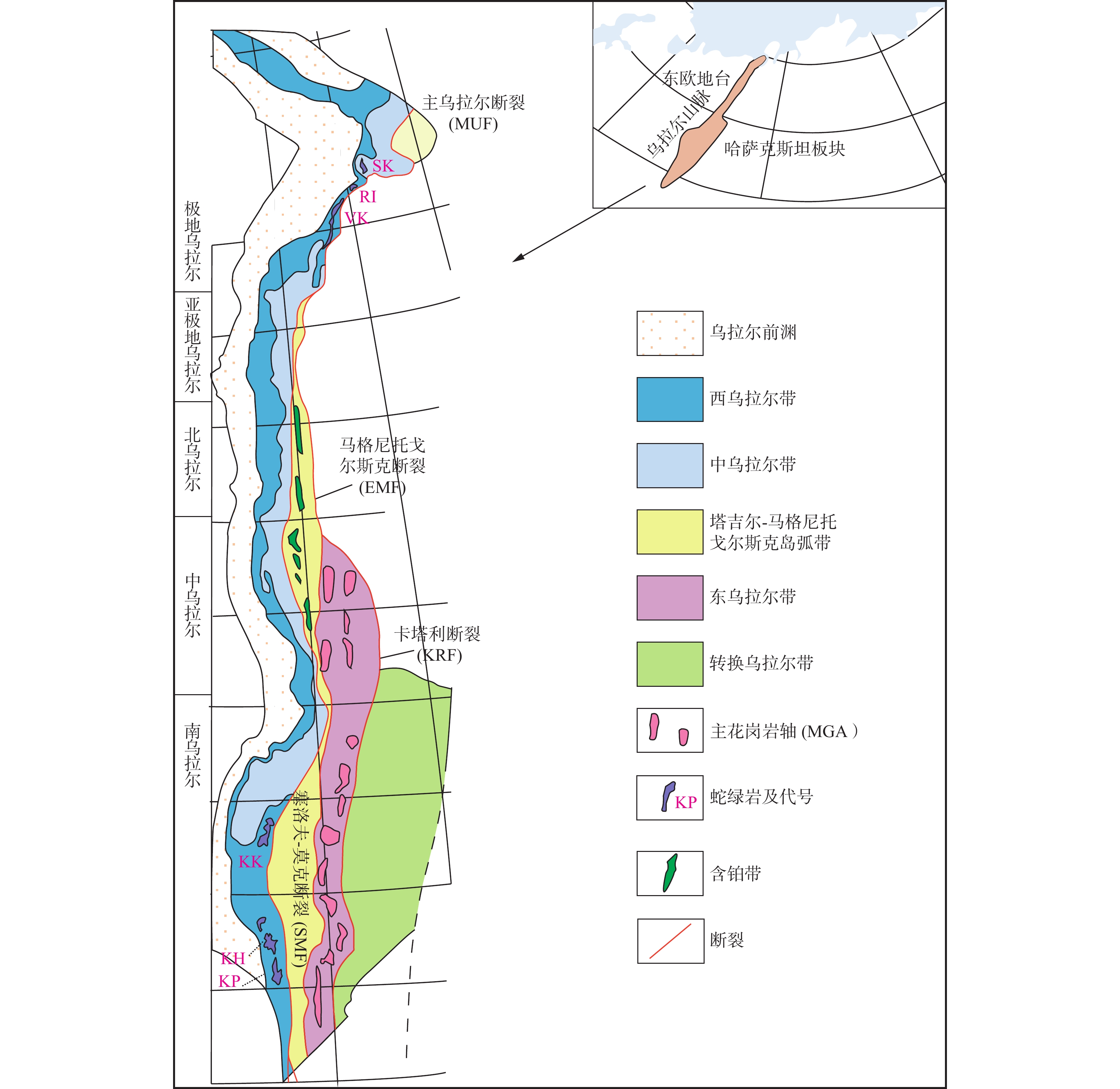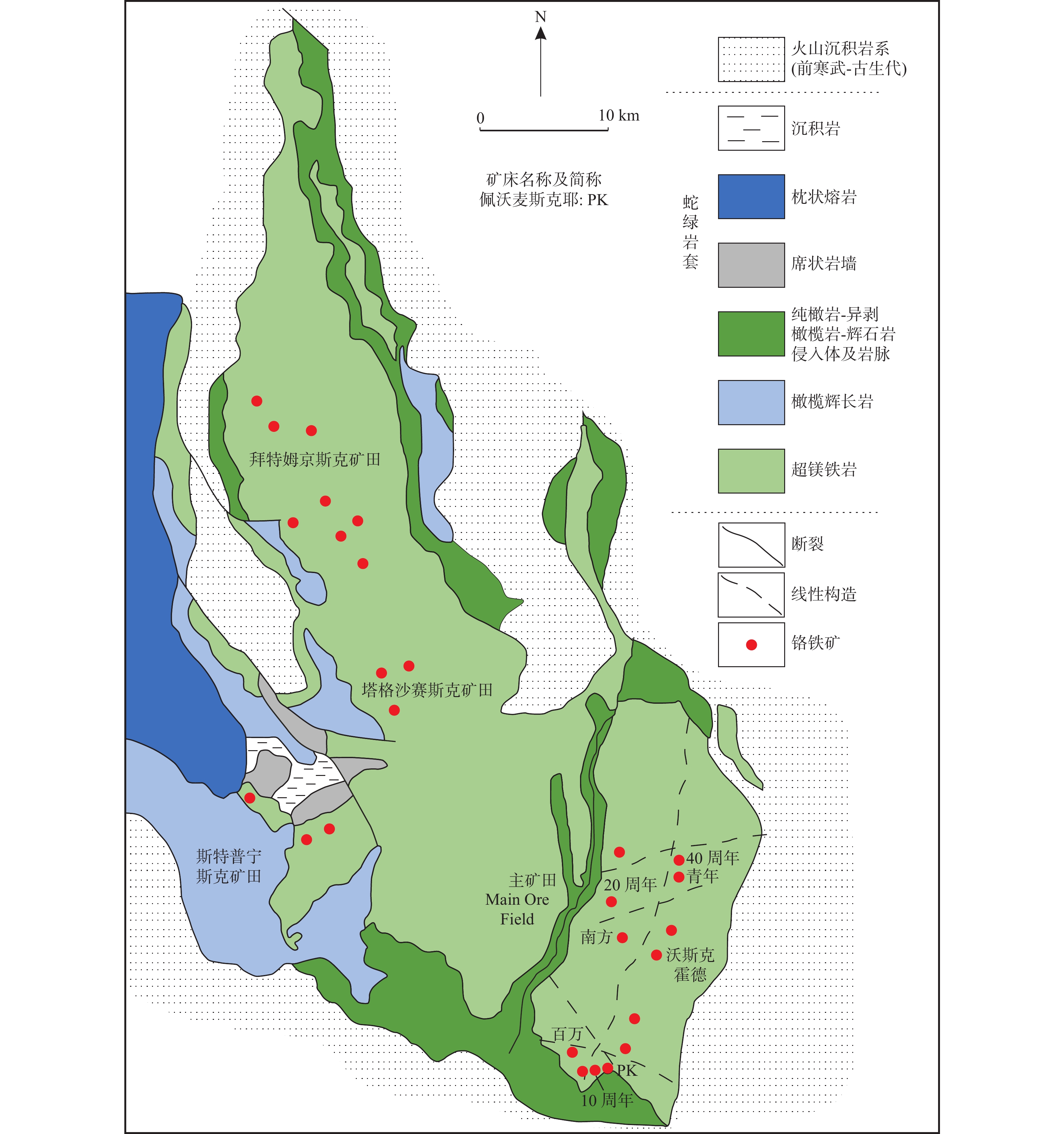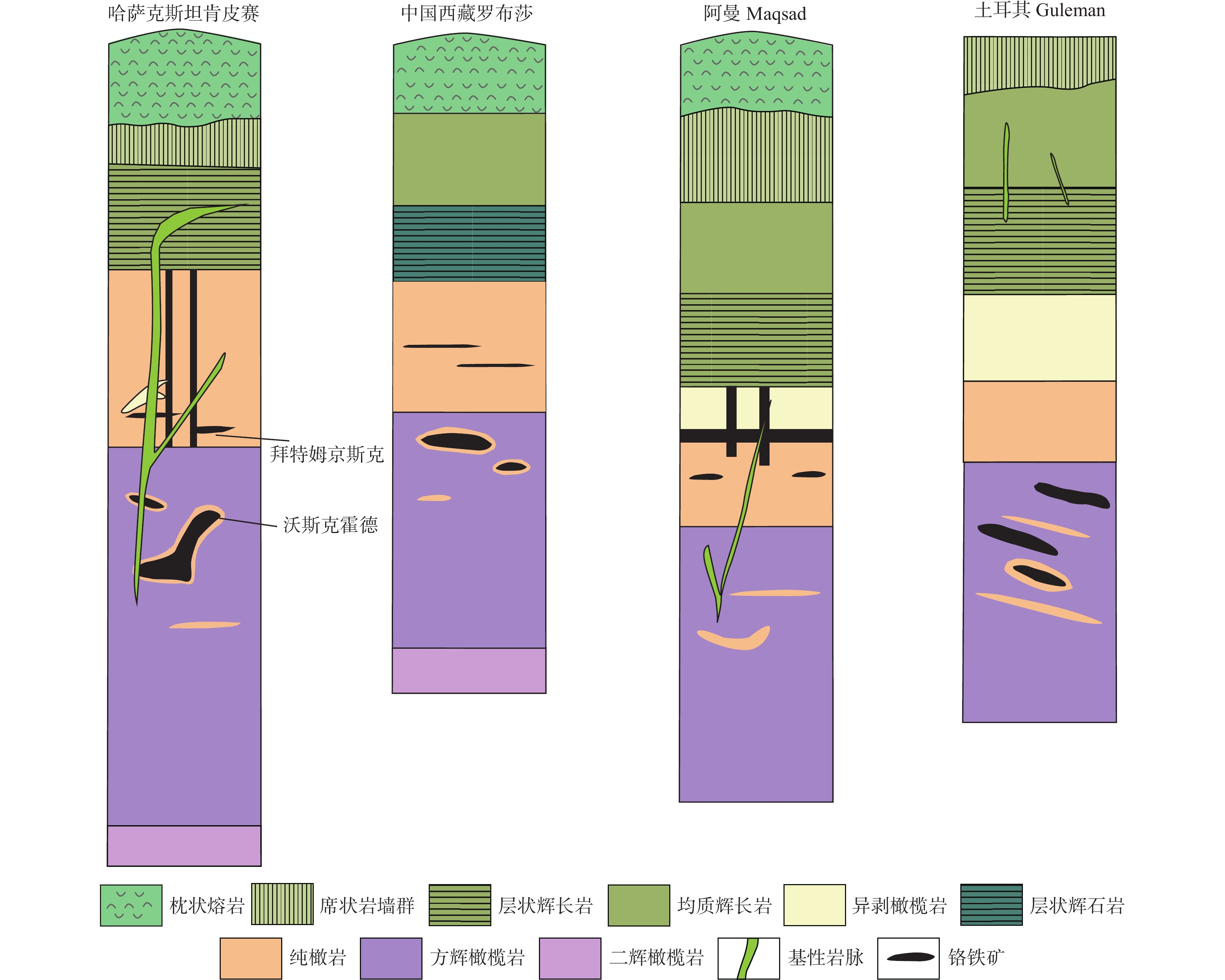Geological Background, Metallogenic Characteristics and Ore Genesis of the KempirsayChromite Resource Base in the Ural, Kazakhstan
-
摘要:
铬铁矿是中国极为短缺的战略性矿产,哈萨克斯坦乌拉尔肯皮赛铬铁矿资源基地是全球最大的豆荚状铬铁矿产地。笔者系统总结了肯皮赛铬铁矿资源基地的地质背景、蛇绿岩特征及成矿类型,并对基地的开发现状进行了梳理。肯皮赛铬铁矿资源基地位于乌拉尔造山带南部,伴随寒武纪—三叠纪古乌拉尔洋形成演化,大量蛇绿岩地体残存于乌拉尔造山带内,形成一系列豆荚状铬铁矿床。肯皮赛地块出露完整的蛇绿岩层序,地幔橄榄岩以方辉橄榄岩和纯橄岩为主,发育高铝型和高铬型两类富铬铁矿。其中,高铝型铬铁矿形成于早泥盆世(或更早)MOR环境下;而高铬型铬铁矿形成于晚泥盆世洋内俯冲环境下(SSZ),是俯冲带流体与残留地幔橄榄岩交代反应后形成的熔体与围岩(地幔橄榄岩)发生熔岩反应的产物。肯皮赛铬铁矿资源基地铬铁矿探明储量约3亿t,年产铬铁矿和铬铁合金约700万t和169万t,主要用于出口。中国应不断加强与哈萨克斯坦的铬铁矿资源潜力调查、勘查开发及产能合作。
Abstract:China ranks at the top in chromium consumption and stainless steel production, yet due to the limited domestic reserve and mine production of chromite ore, the current supply of chromium relies on the main imports from South Africa. Meanwhile, Kazakhstan has a leading position in chromite reserves and mining, mainly from the Kempirsay chromite resource base. On account of the above, this contribution provides an exhaustive summary of the geological background, ophiolites, metallogenic characteristics, the deposit’s genetic types, and the development status of the resource base. The Kempirsay chromite resource base is tectonically located in the Kempirsay massif of southern Urals. Many ophiolites were produced and preserved in the Ural orogenic belt during the opening and closure of the Ural paleo–ocean in the Cambrian to Triassic and host a series of podiform chromite deposits. The Harzburgites and dunites dominate the mantle peridotites, which are outcropped in a complete ophiolite sequence of the Kempirsay massif. Two kinds of chromitite have been found: the high–Al type in the Early Devonian (or earlier) MOR setting and the high–Cr type in the Late Devonian Supra–subduction zone(SSZ). The latter chromitite was formed in the reaction between the melt derived from residual mantle peridotites metasomatized by subduction fluids with depleted mantle during the intra–ocean subduction process. The estimated chromite reserve of the Kempirsay resource base is approximately 300 million tons, forming an annual chromite ore production of 7 million tons. Over half of the 1.69 million tons of ferrochrome production is exported to China. In summary, the Kempirsay chromite resource base in the Ural of Kazakhstan has favorable metallogenetic conditions and progressive mining activities. Thus, China should endeavor to strengthen cooperation with Kazakhstan in the potential resource investigation, exploration, mining of chromite resources, and related industry capacity.
-
Key words:
- podiform chromite /
- ophiolite /
- ore genesis /
- Kempirsay chromite resource base /
- Ural orogenic belt /
- Kazakhstan
-

-
图 1 乌拉尔造山带构造简图及蛇绿岩分布图(构造分区据李三忠等,2016;Puchkov,2017修改)
Figure 1.
图 3 哈萨克斯坦肯皮赛地块地质简图及铬铁矿分布图(据Melcher et al.,1997修改)
Figure 3.
图 4 肯皮赛与世界典型蛇绿岩的岩性柱状示意图(图上厚度未按比例)(据Melcher et al.,1997;Rizeli et al.,2016;陈艳虹等,2018;Rollinson et al.,2018; Pirajno et al.,2020修改)
Figure 4.
表 1 哈萨克斯坦乌拉尔肯皮赛铬铁矿资源基地主要矿山统计表
Table 1. Main mines in Kempirsay chromite resource base of Ural, Kazakhstan
矿业项目 矿山 储量/矿石量(Mt) 资源量/矿石量(Mt) 平均品位/%(Cr2O3) 产量/矿石量(Mt) 所有者 顿斯克伊 十周年 158.1 202.4 49.9 2.5 哈萨克斯坦铬业公司 青年 3.1 4.1 50.4 2.3 南方 0.6 0.6 51.7 0.6 佩沃麦斯克耶 3 0.3 7号异常 0.2 41.2 沃斯克霍德 沃斯克霍德 19 48.5 1.05 土耳其伊德勒姆集团 合计 183.8 207.3 6.75 注: 数据来源于哈萨克斯坦铬业公司、土耳其伊德勒姆公司以及标普数据库(截至2021年底)。 -
鲍佩声. 再论蛇绿岩中豆荚状铬铁矿的成因—质疑岩石/熔体反应成矿说[J]. 地质通报, 2009, 28(12): 1741-1761 doi: 10.3969/j.issn.1671-2552.2009.12.008
BAO Peisheng. Further discussion on the genesis of the podiform chromite deposits in the ophiolites—questioning about the rock/ melt interaction metallogeny[J]. Geological Bulletin of China, 2009, 28(12): 1741-1761. doi: 10.3969/j.issn.1671-2552.2009.12.008
鲍佩声. 元古代蛇绿岩及铬铁矿[J]. 岩石学报, 2019, 35(10): 2971-2988 doi: 10.18654/1000-0569/2019.10.03
BAO Peisheng. Proterozoic ophiolite and chromite[J]. Acta Petrologica Sinica, 2019, 35(10): 2971-2988. doi: 10.18654/1000-0569/2019.10.03
陈其慎, 张艳飞, 邢佳韵, 等. 国内外战略性矿产厘定理论与方法[J]. 地球学报, 2021, 42(2): 137-144 doi: 10.3975/cagsb.2020.102604
CHEN Qishen, ZHANG Yanfei, XING Jiayun, et al. Methods of strategic mineral resources determination in China and abroad[J]. Acta Geoscientica Sinica, 2021, 42(2): 137-144. doi: 10.3975/cagsb.2020.102604
陈艳虹, 杨经绥. 豆荚状铬铁矿床研究回顾与展望[J]. 地球科学, 2018, 43(4): 991-1010
CHEN Yanhong, YANG Jingsui. Formation of podiform chromitite deposits: review and prospects[J]. Earth Science, 2018, 43(4): 991-1010.
成金华, 刘凯雷, 徐德义, 等. 战略性关键矿产资源可供性研究现状与展望[J]. 河北地质大学学报, 2021, 44(1): 95-103
CHENG Jinhua, LIU Kailei, XU Deyi, et al. Review of the research on strategic and critical mineral resources availability[J]. Journal of Hebei Geo University, 2021, 44(1): 95-103.
高永伟, 刘明义, 张丹丹, 等. 哈萨克斯坦主要矿产资源特征及矿业投资环境[J]. 地质与勘探, 2022, 58(2): 454-464
GAO Yongwei, LIU Mingyi, ZHANG Dandan, et al. Characteristics of main mineral resources and mining investment environment in Kazakhstan[J]. Geology and Exploration, 2022, 58(3): 454-464.
计文化, 张海迪, 杨博, 等. 中亚重要成矿带成矿规律与优势矿产资源潜力评价综合研究报告[R]. 中国地质调查局西安地质调查中心, 2013.
李江海, 牛向龙, 黄雄南, 等. 豆荚状铬铁矿: 古大洋岩石圈残片的重要证据[J]. 地学前缘, 2002, 9(4): 235-246 doi: 10.3321/j.issn:1005-2321.2002.04.003
LI Jianghai, NIU Xianglong, HUANG Xiongnan, et al. Podiform chromitites: a key to identify the ancient oceanic lithospheric relicts[J]. Earth Science Frontiers, 2002(4): 235-246. doi: 10.3321/j.issn:1005-2321.2002.04.003
李三忠, 杨朝, 赵淑娟, 等. 全球早古生代造山带(Ⅱ): 俯冲-增生型造山[J]. 吉林大学学报(地球科版), 2016, 46(4): 968-1004
LI Sanzhong, YANG Zhao, ZHAO Shujuan, et al. Global early Paleozoic Orogens(Ⅱ): subduction-accretionary-type Orogeny[J]. Journal of Jilin University (Earth Science Edition), 2016, 46(04): 968-1004.
李文渊. 块状硫化物矿床的类型、分布和形成环境[J]. 地球科学与环境学报, 2007, 29(4): 331-344 doi: 10.3969/j.issn.1672-6561.2007.04.001
LI Wenyuan. Classification, distribution and forming setting of massive sulfide deposits[J]. Journal of Earth Sciences and Environment, 2007, 29(4): 331-344. doi: 10.3969/j.issn.1672-6561.2007.04.001
刘全文, 沙景华, 闫晶晶, 等. 中国铬资源供应风险评价与对策研究[J]. 资源科学, 2018, 40(3): 516-525
LIU Quanwen, SHA Jinghua, YAN Jingjing, et al. Risk assessment and countermeasures of chromium resource supply in China[J]. Resources Science, 2018, 40(3): 516-525.
刘婷, 郑有业, 郭统军. 大中型豆荚状铬铁矿床地球化学特征研究[J]. 地质科技情报, 2019, 38(2): 217-225
LIU Ting, ZHENG Youye, GUO Tongjun. Optimal geochemical features of medium and large-sized podiform chromite ores[J]. Geological Science and Technology Information, 2019, 38(2): 217-225.
吕鹏瑞, 高永伟, 张宇轩, 等. 哈萨克斯坦铬铁矿资源禀赋、供应格局与中哈产能合作建议[J]. 西北地质, 2022, 55(3): 297-305
LÜ Pengrui, GAO Yongwei, ZHANG Yuxuan, et al. Kazakhstan's Chromite Resource Endowment, Development, Import and its Suggestions for Production Capacity Cooperation between China and Kazakhstan[J]. Northwestern Geology, 2022, 55(3): 297-305.
苏本勋, 白洋, 陈晨, 等. 铬铁矿床母岩浆含水性的岩石矿物学探讨[J]. 矿物岩石地球化学通报, 2018, 37(6): 1035-1046
SU Benxun, BAI Yang, CHEN Chen, et al. Petrological and mineralogical investigations on hydrous properties of parental magmas of chromite deposits[J]. Bulletin of Mineralogy, Petrology and Geochemistry, 2018, 37(06): 1035-1046.
王登红. 关键矿产的研究意义、矿种厘定、资源属性、找矿进展、存在问题及主攻方向[J]. 地质学报, 2019, 93(6): 1189-1209 doi: 10.3969/j.issn.0001-5717.2019.06.003
WANG Denghong. Study on critical mineral resources: significance of research, determination of types, attributes of resources, progress of prospecting, problems of utilization, and direction of exploitation[J]. Acta Geologica Sinica, 2019, 93(6): 1189-1209. doi: 10.3969/j.issn.0001-5717.2019.06.003
王九一. 全球高纯石英原料矿的资源分布与开发现状[J]. 岩石矿物学杂志, 2021, 40(1): 131-141 doi: 10.3969/j.issn.1000-6524.2021.01.012
WANG Jiuyi. Global high purity quartz deposits: resources distribution and exploitation status[J]. Acta Petrologica et Mineralogica, 2021, 40(1): 131-141. doi: 10.3969/j.issn.1000-6524.2021.01.012
王玉往, 王京彬, 王莉娟, 等. 新疆北部镁铁-超镁铁质岩的PGE成矿问题[J]. 地学前缘, 2010, 17(1): 137-152
WANG Yuwang, WANG Jingbin, WANG Lijuan, et al. PGE metallogenesis related to mafic-ultramafic complex in North Xinjiang[J]. Earth Science Frontiers, 2010, 17(1): 137-152.
熊发挥, 杨经绥, 巴登珠, 等. 西藏罗布莎不同类型铬铁矿的特征及成因模式讨论[J]. 岩石学报, 2014, 30(8): 2137-2163
XIONG Fahui, YANG Jingsui, BA Dengzhu, et al. Different type of chromitite and genetic model from Luobusa ophiolite, Xizang[J]. Acta Petrologica Sinica, 2014, 30(8): 2137-2163.
杨经绥, 张仲明, 李天福, 等. 西藏罗布莎铬铁矿体围岩方辉橄榄岩中的异常矿物[J]. 岩石学报, 2008, 24(7): 1445-1452
YANG Jingsui, ZHANG Zhongming, LI Tianfu, et al. Unusual minerals from harzburgite, the host rock of the Luobusa chromite deposit, Xizang[J]. Acta petrologica Sinica, 2008, 24(7): 1445-1452
翟明国, 胡波. 矿产资源国家安全、国际争夺与国家战略之思考[J]. 地球科学与环境学报, 2021, 43(1): 1-11 doi: 10.19814/j.jese.2020.10018
ZHAI Mingguo, HU Bo. Thinking to state security, international competition and national strategy of mineral resources[J]. Journal of Earth Sciences and Environment, 2021, 43(1): 1-11. doi: 10.19814/j.jese.2020.10018
张炜. 世界铬矿资源需求分析及预测[J]. 资源与产业, 2016, 18(4): 87-91 doi: 10.13776/j.cnki.resourcesindustries.2016.04.012
ZHANG Wei. Demand analysis and prediction of world chrome resource[J]. Resources and Industries, 2016, 18(4): 87-91. doi: 10.13776/j.cnki.resourcesindustries.2016.04.012
张伟波, 刘翼飞, 何学洲. 非洲铬铁矿资源分布与找矿潜力[J]. 中国矿业, 2019, 28(4): 79-83
ZHANG Weibo, LIU Yifei, HE Xuezhou. Distribution and prospecting potential of chromite resource in Africa[J]. China Mining Magazine, 2019, 28(4): 79-83.
赵宏军, 陈玉明, 陈秀法, 等. 全球铬铁矿床成因类型、地质特征及时空分布规律初探[J]. 矿床地质, 2021, 40(6): 1312-1326 doi: 10.16111/j.0258-7106.2021.06.012
ZHAO Hongjun, CHEN Yuming, CHEN Xiufa, et al. A review on genetic types, geological characteristics and temporal and spatial distribution of chromite deposits in world[J]. Mineral Deposits, 2021, 40(6): 1312-1326. doi: 10.16111/j.0258-7106.2021.06.012
中华人民共和国自然资源部. 中国矿产资源报告2021[M]. 北京: 地质出版社, 2021: 4-12
Ministry of Natural Resources, PRC. 2021 China Mineral Resources[M]. Beijing: Geological Publishing House, 2021: 4-12
Arai S, Miura M. Podiform chromitites do form beneath mid-ocean ridges[J]. Lithos, 2015, 232: 143-149. doi: 10.1016/j.lithos.2015.06.015
Arai S, Yurimoto H. Podiform chromitites of the Tari-Misaka ultramafic complex, southwestern Japan, as mantle-melt interaction products[J]. Economic Geology, 1994, 89(6): 1279-1288. doi: 10.2113/gsecongeo.89.6.1279
Arai S. Origin of podiform chromitites[J]. Journal of Asian Earth Sciences, 1997, 15(2-3): 303-310. doi: 10.1016/S0743-9547(97)00015-9
Batanova V G, Belousov I A, Savelieva G N, et al. Consequences of Channelized and Diffuse Melt Transport in Supra-subduction Zone Mantle: Evidence from the Voykar Ophiolite (Polar Urals)[J]. Journal of Petrology, 2011, 52(12): 2483-2521. doi: 10.1093/petrology/egr053
Belova A A, Ryazantsev A V, Razumovsky A A, et al. Early Devonian suprasubduction ophiolites of the southern Urals[J]. Geotectonics, 2010, 44(4): 321-343. doi: 10.1134/S0016852110040035
Dick H J B, Bullen T. Chromian spinel as a petrogenetic indicator in abyssal and alpine-type peridotites and spatially associated lavas[J]. Contributions to Mineralogy and Petrology, 1984, 86(1): 54-76 doi: 10.1007/BF00373711
Distler V V, Kryachko V V, Yudovskaya M A. Formation conditions of platinum-group metals in chromite ores of the Kempirsai ore field[J]. Geology of Ore Deposits, 2003, 45(1): 37-65.
Furnes H, Wit M D, Dilek Y. Four billion years of ophiolites reveal secular trends in oceanic crust formation[J]. Geoscience Frontiers, 2014, 5(4): 571-603. doi: 10.1016/j.gsf.2014.02.002
Garuti G, Pushkarev E V, Thalhammer O A R, et al. Chromitites of the urals (part 1): overview of chromite mineral chemistry and geo-tectonic setting[J]. Ofioliti, 2012, 37(1) : 27-53.
González-Jiménez J M, Proenza J A, Gervilla F, et al. High-Cr and high-Al chromitites from the Sagua de Tánamo district, Mayarí-Cristal ophiolitic massif (eastern Cuba): Constraints on their origin from mineralogy and geochemistry of chromian spinel and platinum-group elements[J]. Lithos, 2011, 125(1-2): 101-121. doi: 10.1016/j.lithos.2011.01.016
Graham I T, Franklin B J, Marshall B. Chemistry and mineralogy of podiform chromititee deposits, southern NSW, Australia: a guide to their origin and evolution[J]. Mineralogy and Petrology, 1996, 37: 129-150.
Haldar S K. Platinum-Nickel-Chromium Deposits: Geology, Exploration, and Reserve Base[M]. Elsevier, 2017: 179-181.
Ivanov K S, Puchkov V N, Fyodorov Y N, et al. Tectonics of the Urals and adjacent part of the West-Siberian platform basement: Main features of geology and development[J]. Journal of Asian Earth Sciences, 2013, 72: 12-24. doi: 10.1016/j.jseaes.2013.02.029
Kamenetsky V S, Crawford A J, Meffre S. Factors controlling chemistry of magmatic spinel: an empirical study of associated olivine, Cr-spinel and melt inclusions from primitive rocks[J]. Journal of Petrology, 2001, 42(4): 655-671. doi: 10.1093/petrology/42.4.655
Melcher F, Grum W, Simon G, et al. Petrogenesis of the Ophiolitic Giant Chromite Deposits of Kempirsai, Kazakhstan: a Study of Solid and Fluid Inclusions in Chromite[J]. Journal of Petrology, 1997, 38(10): 1419-1458. doi: 10.1093/petroj/38.10.1419
Melcher F, Grum W, Thalhammer T V, et al. The giant chromite deposits at Kempirsai, Urals: constraints from trace element (PGE, REE) and isotope data[J]. Mineralium Deposita, 1999, 34: 250-272. doi: 10.1007/s001260050202
Mondal S K, Khatun S, Prichard H M, et al. Platinum-group element geochemistry of boninite-derived Mesoarchean chromitites and ultramafic-mafic cumulate rocks from the Sukinda Massif (Orissa, India)[J]. Ore Geology Reviews, 2019, 104: 722-744. doi: 10.1016/j.oregeorev.2018.11.027
Pirajno F, Uysal I, Naumov E A. Oceanic lithosphere and ophiolites: Birth, life and final resting place of related ore deposits[J]. Gondwana Research, 2020, 88(5): 333-352.
Prochaska W, Krupenin M. Formation of magnesite and siderite deposits in the Southern Urals-evidence of inclusion fluid chemistry[J]. Mineralogy and Petrology, 2013, 107(1): 53-65. doi: 10.1007/s00710-012-0251-5
Puchkov V N. General features relating to the occurrence of mineral deposits in the Urals: What, where, when and why[J]. Ore Geology Reviews, 2017, 85: 4-29. doi: 10.1016/j.oregeorev.2016.01.005
Puchkov V N. Structural stages and evolution of the Urals[J]. Mineralogy and Petrology, 2013, 107(1): 3-37. doi: 10.1007/s00710-012-0263-1
Puchkov V N. The diachronous (step-wise) arc-continent collision in the Urals[J]. Tectonophysics, 2009, 479(1-2): 175-184. doi: 10.1016/j.tecto.2009.01.014
Rizeli M E, Beyarslan M, Wang K L, et al. Mineral chemistry and petrology of mantle peridotites from the Guleman ophiolite (SE Anatolia, Turkey): evidence of a forearc setting[J]. Journal of African Earth Sciences, 2016, 123: 392-402. doi: 10.1016/j.jafrearsci.2016.08.013
Rollinson H, Mameri L, Barry T. Polymineralic inclusions in mantle chromitites from the Oman ophiolite indicate a highly magnesian parental melt[J]. Lithos, 2018, 310-311: 381-391. doi: 10.1016/j.lithos.2018.04.024
Saveliev D E. Chromitites of the Kraka ophiolite (South Urals, Russia): geological, mineralogical and structural features[J]. Mineralium Deposita, 2021, 56(6): 1111-1132. doi: 10.1007/s00126-021-01044-5
Savelieva G N, Sharaskin A Y, Saveliev A A, et al. Ophiolites and zoned mafic-ultramafic massifs of the Urals: a comparative analysis and some tectonic implications[A]. In: Brawn D, Juhlin C, Puchkov V (eds) Mountain Building in the Uralides: Pangea to Present[C]. Geophysical Monographs, American Geophysical Union, 2002, 132: 111-137.
Savelieva G N. Ophiolites in European Variscides and Uralides: Geodynamic settings and metamorphism[J]. Geotectonics, 2011, 45(6): 439-452. doi: 10.1134/S0016852111060070
Shemelev V R. Mantle Ultrabasites of Ophiolite Complexes in the Polar Urals: Petrogenesis and Geodynamic Environments[J]. Petrology, 2011, 19(6): 618-640. doi: 10.1134/S0869591111060038
Thayer P T. Principal features and origin of podiform chromite deposits, and some observations on the Guelman-Soridag District, Turkey[J]. Economic Geology, 1964, 59(8): 1497-1524. doi: 10.2113/gsecongeo.59.8.1497
USGS. Mineral commodity summaries 2022[R]. 2022.
Uysal İ, Tarkian M, Sadiklar M B, et al. Petrology of Al- and Cr-rich ophiolitic chromitites from the Muğla, SW Turkey: implications from composition of chromite, solid inclusions of platinum-group mineral, silicate, and base-metal mineral, and Os-isotope geochemistry[J]. Contributions to Mineralogy and Petrology, 2009, 158(5): 659-674 doi: 10.1007/s00410-009-0402-9
Xiong F H, Zoheir B, Robinson P T, et al. Genesis of the Ray-Iz chromitite, Polar Urals: Inferences to mantle conditions and recycling processes[J]. Lithos, 2020, 374-375: 105699. doi: 10.1016/j.lithos.2020.105699
Yang J S, Dobrzhinetskaya L, Bai WJ, et al. Diamond- and coesite-bearing chromitites from the luobusa ophiolite, Xizang[J]. Geology, 2007, 35(10): 875-878. doi: 10.1130/G23766A.1
Yang J S, Meng F C, Xu X Z, et al. Diamonds, native elements and metal alloys from chromitites of the Ray-Iz ophiolite of the Polar Urals[J]. Gondwana Research, 2015, 27(2) : 459-485. doi: 10.1016/j.gr.2014.07.004
Zaccarini F, Pushkarev E, Garuti G. Platinum-group element mineralogy and geochemistry of chromitite of the Kluchevskoy ophiolite complex, central Urals (Russia)[J]. Ore Geology Reviews, 2008, 33(1): 20-30. doi: 10.1016/j.oregeorev.2006.05.007
Zhou M F, Robinson P T, Bai WJ. Formation of podiform chromitites by melt/rock interaction in the upper mantle[J]. mineralium deposita, 1994, 29: 98-101. doi: 10.1007/BF03326400
Zhou M F, Robinson P T, Malpas J, et al. Podiform chromitites in the luobusa ophiolite (southernXizang): implications for melt-rock interaction and chromite segregation in the upper mantle[J]. Journal of Petrology, 1996, 37(1): 3-21. doi: 10.1093/petrology/37.1.3
Zhou M F, Robinson P T. Origin and tectonic environment of podiform chromite deposits[J]. Economic Geology, 1997, 92(2): 259-262. doi: 10.2113/gsecongeo.92.2.259
Zhou M F, Sun M, Keays R R, et al. Controls on platinum-group elemental distributions of podiform chromitites: a case study of high-Cr and high-Al chromitites from Chinese orogenic belts[J]. Geochimica et Cosmochimica Acta, 1998, 62(4): 677-688. doi: 10.1016/S0016-7037(97)00382-7
-




 下载:
下载:




